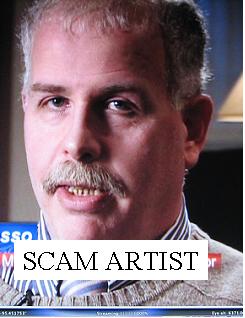Email example contributed by J. Hamilton, 5 Dec. 2003:
| We all receive emails all the time regarding one scam or another; but last week I REALLY DID get scammed! Both VISA and MasterCard told me that this scam is currently being worked throughout the Midwest, with some variance as to the product or amount, and if you are called, just hang up. My husband was called on Wednesday from "VISA" and I was called in Thursday from "MasterCard". It worked like this: Person calling says, "This is Carl Patterson and I'm calling from the Security and Fraud department at VISA. My Badge number is 12460. Your card has been flagged for an unusual purchase pattern, and I'm calling to verify. This would be on your VISA card issued by 5/3 bank. Did you purchase an Anti-Telemarketing Device for $497.99 from a marketing company based in Arizona?" When you say "No". The caller continues with, "Then we will be issuing a credit to your account. This is a company we have been watching and the charges range from $297 to $497, just under the $500 purchase pattern that flags most cards. Before your next statement, the credit will be sent to (gives you your address), is that correct?" You say, "Yes". The caller continues..."I will be starting a fraud investigation. If you have any questions, you should call the 800 number listed on your card 1-800-VISA and ask for Security. you will need to refer to this Control #". Then gives you a 6 digit number. "Do you need me to read it again?" Caller then says he "needs to verify you are in possession of your card. Turn the card over. There are 7 numbers; first 4 are 1234(whatever) the next 3 are the security numbers that verify you are in possession of the card. These are the numbers you use to make internet purchases to prove you have the card. Read me the 3 numbers." Then he says "That is correct. I just needed to verify that the card has not been lost or stolen, and that you still have your card. Do you have any other questions? Don't hesitate to call back if you do." You actually say very little, and they never ask for or tell you the card number. But after we were called on Wednesday, we called back within 20 minutes to ask a question. Are we glad we did! The REAL VISA security dept. told us it was a scam and in the last 15 minutes a new purchase of $497.99 WAS put on our card. Long story made short...we made a real fraud report and closed the VISA card and they are reissuing as a new number. What the scam wants is the 3 digit number! and that once the charge goes through, they keep charging every few days. By the time you get your statement, you think the credit is coming, and then its harder to actually file a fraud report. The real VISA reinforced that they will never ask for anything on the card (they already know). What makes this more remarkable is that on Thursday, I got a call from "Jason Richardson of MasterCard" with a word for word repeat of the VISA Scam. This time I didn't let him finish. I hung up. We filed a police report (as instructed by VISA), and they said they are taking several of these reports daily and to tell friends, relatives and co-workers. |
For a long time banks and their associated credit card companies have been warning people about providing personal information through phone calls or online. Cons are often able to obtain at least partial information about their potential victim's accounts; particularly if they have access to a system that reveals personal information like autotrack. If someone pretending to be representing a company 'verifies' your account by requesting details like the three-digit security code, BEWARE. They might ask for other information; for example, they might provide the last four digits of your account (which would show up on sales receipts) and ask the other 12 digits to 'confirm' it. Or...they might already know your entire account number and ask for the expiration date or your billing address to 'confirm'. Any of these little pieces of information may be just what the con artist needs to get full access to your account.
People should know that financial institutions or legitimate businesses may request your three-digit security number to authenticate a transaction. What's important is you be fully aware of the legitimacy of the requestor before you give it out; it could cost you!
Sources and further reading:
Beware of Telephone Credit Card Scammers
TheBostonChannel.com, 24 December 2003Credit Card Fraud
AARP's recommendations for avoiding credit card fraud and identity theftHow to Avoid Credit Scams
Straightforward tips from About's Credit/Debt Management GuideAvoiding Credit Card Fraud
Entrepreneur.com, 9 September 2002About Identity Theft
Federal Trade Commission consumer tipsCredit Card Industry Terms Defined
Entrepreneur.com, 22 October 2001
Joe Cafasso


1 comment:
That's really awful - glad you coped with the problem so soon. As I read about credit cards and banks, I start to think it is getting more and more dangerous to use them. But we are so much addicted to them!
Post a Comment